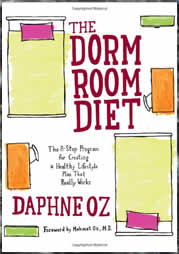Dorm Room Diet
 The Dorm Room Diet is a guide to help college students avoid the dreaded ‘Freshmen 15’ by learning healthy eating habits and avoiding the common pitfalls and challenges associated with college life – such as late night studying and parties.
The Dorm Room Diet is a guide to help college students avoid the dreaded ‘Freshmen 15’ by learning healthy eating habits and avoiding the common pitfalls and challenges associated with college life – such as late night studying and parties.
It was written by Daphne Oz, who is the daughter of Lisa and Dr. Mehmet Oz, co-authors of the bestselling books, You: The Owner’s Manual, You: The Smart Patient, and You: On a Diet.
Daphne gained weight during her teenage years and lost 30 pounds after she started college and has written about her experiences and success in changing her lifestyle.
Dorm Room Diet Basics
The Dorm Room Diet is not a specific diet plan but more of a healthy diet and lifestyle guide that is targeted at young women who are starting college. It advocates sensible principles of eating, exercise and the use of nutritional supplements.
The Dorm Room Diet Program includes 8 Steps
- Get Inspired
- Get Informed: The Fresh 15
- Get Started: Healthy Eating 101
- Get a Grip: Where and How to Eat Responsibly at College
- Get Prepared: The Five Danger Zones and How to Survive Them
- Get Moving: The Exercise Factor
- Get Your Vitamins: Everything You Need to Know About Supplements
- Get Recharged: A More Relaxed, More Effective You
The rules of the plan are simple:
- Always eat breakfast
- Drink half your body weight in ounces of water daily, including one glass before every meal.
- Eat something every three hours (three meals and two snacks of fruit or veggies).
- Don’t eat anything at least two hours before bed.
- Be prepared for study sessions with healthy snacks.
- When craving unhealthy foods count to your age before you “cheat.”
The book includes many practical tips and food suggestions with an emphasis on eating for health.
General recommendations include avoiding sugary cereals and fried food, creamy sauces, full fat dairy products and sodas. Her approach is not overly restrictive and allows treats in moderation.
Recommended Foods
Daphne suggests keeping a supply of fruit and vegetables on hand for snacks and preparing for late night study sessions with healthy fuel sources like apples, pears, rice cakes and soy crisps.
She also recommends eating a handful of semisweet chocolate chips to cope with fatigue during long study sessions, which is about 100 calories and contains less sugar than milk chocolate.
If craving something sweet at night Daphne advises to have sparkling water with fruit juice before eating anything because, as she says, the bubbles fill you up without making you feel bloated and this can avoid intake of excess calories before bed.
She also suggests eating grapefruit because it is a natural appetite suppressant.
Find some quick and easy healthy recipes here.
Use the College Gym
Daphne advises college students to utilize the college gym at least 3 days a week with a combination of cardio and resistance exercises and also offers advice for exercising in a small space such as a dorm room.
She has also combined with Celebrity trainer Joel Harper to create a 20 minute workout DVD that is sold separately to the book.
These exercises can also be used with the Dorm Room Diet.
Costs and Expenses
The Dorm Room Diet Retails for $16.95 US
Pros
- Especially suitable for young female college students as deals with the issues surrounding this group that may impact on the ability to make healthy food choices.
- Helps to increase awareness about emotional triggers of overeating and the reasons for being motivated to undertake a healthier lifestyle.
- Practical advice that is easy to follow with a good variety of food recommendations.
Cons
- May not be as beneficial for those that don’t fit into the target audience.
- May be difficult for those on a collage budget to stick with the food and supplement recommendations.
Will Appeal to College Students
Daphne writes in an easy to read style and many readers will relate to her personal experience and success with losing weight.
The book’s strongest point is the emphasis placed on adjusting to the specific challenges of collage life. It is a balanced approach that helps college students to become more aware of their relationship to food and gives practical and easy to follow advice on how to stay healthy and avoid gaining weight during this transition.
-
References:
- Oz, D. (2006). Dorm Room Diet. Newmarket Press.
- Cluskey, M., & Grobe, D. (2009). College weight gain and behavior transitions: male and female differences. Journal of the American Dietetic Association, 109(2), 325-329. link
- Anderson, D. A., Shapiro, J. R., & Lundgren, J. D. (2003). The freshman year of college as a critical period for weight gain: An initial evaluation. Eating Behaviors, 4(4), 363-367. link
- Lowe, M. R., Annunziato, R. A., Markowitz, J. T., Didie, E., Bellace, D. L., Riddell, L., … & Stice, E. (2006). Multiple types of dieting prospectively predict weight gain during the freshman year of college. Appetite, 47(1), 83-90. link
it has worked for me so far!!